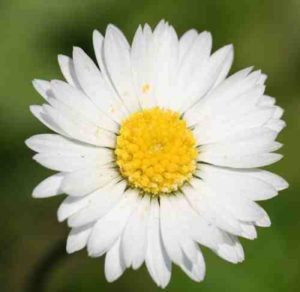Bellis is actually a genus comprising as many as 15 species of flowering plants belonging to the Asteraceae family. While the genus is native to Europe and the Mediterranean region, only this species of this genus has been introduced to Northern America and other regions of the world.
Contents
Uses
It was used as a cure for bronchitis. The plant was washed, mashed and pressed and the obtained juice was mixed with sugar, then consumed several times a day. Some boiled it covered, mix the decoct with honey and prepare a syrup that was consumed in amounts of 1-2 tablespoons a day against chronic bronchitis.
Benefits
Daisies contain essential oil, tannins, mucus substances, flavonoids, bitter substances, organic acids, resins and inulin. The active ingredients are found in all parts of the plant.
Daisy has anti-inflammatory and mild astringent properties and has been used internally, in tea form, as herbal remedy for the common cold, bronchitis and other inflammation of the upper respiratory tract.
The herb may be used for loss of appetite as it has stimulating effect on the digestion system and it has been used as a treatment for many ailments of the digestive tract, such as gastritis, diarrhea, liver and gallbladder complaints and mild constipation.
Daisies have been used traditionally for painful menstruation, cystitis and other inflammations of the urinary tract. Additionally, it may have its uses as a natural treatment for atopic dermatitis, gout and chronic rheumatic conditions.
The plant is known for its healing properties and can be used topically on small wounds, sores and scratches to speed up the healing process. In addition it has been used externally for dermatitis, rash, eczema, bruises and boils.
Tincture made from the herb can be used for acne, and as mouth wash or a gargle it may be used as a remedy for mouth inflammation and sore throat. Also, chewing on the fresh leaves might be helpful as a relief for mouth ulcers.
In folk medicine, it was often recommended to eat the fresh leaves to stimulate the nutrition uptake, due to the bitter substances found in the herb.
The fresh leaves, flowers, buds and petals have a pleasant taste and can be used in salads or added to soups. Furthermore, the flower heads can be used in vinegar and as a substitute for capers.
Cautions
There are no reports of contraindications or side effects when the herb is used properly. People with known allergic reactions to plants belonging the Asteraceae family should handle daisies with care.
Interactions
None are recorded.
Other names
Common daisy, garden daisy, English daisy, meadow daisy, bruisewort, tusindfryd (Danish), chiribita (Spanish), paquerette vivace (French), Gänseblümchen (German).
References
Source: HerbalSupplementResources, http://www.herbal-supplement-resource.com/daisy-herb-benefits.html
Herbs2000, http://www.herbs2000.com/homeopathy/bellis.htm
LiveandFeel, http://www.liveandfeel.com/articles/small-daisies-health-benefits-bellis-perennis-fam.-compositae-1761

